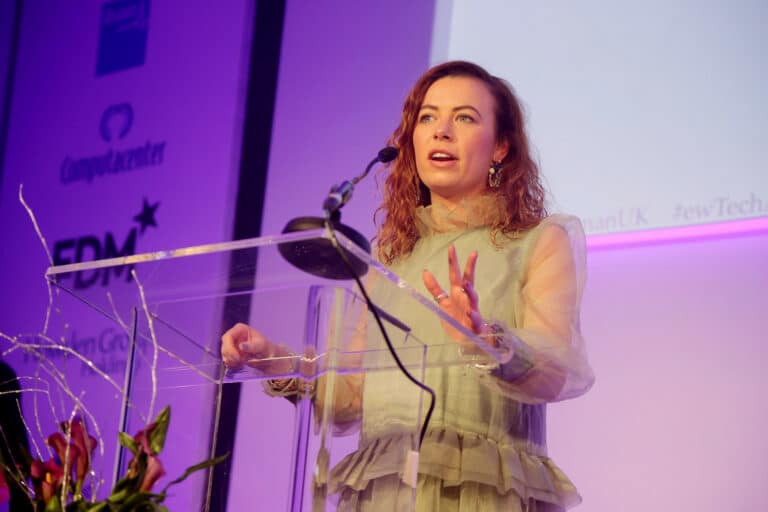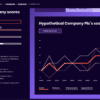Although it might seem “impossible” to reach so many children, she believes child labour continues to rise as it is often entwined in other issues such as poverty or modern slavery.
“The real root causes are often lack of basic need,” she explains. “It’s often tagged alongside modern slavery or something else. But it’s four times more prevalent than modern slavery, it’s not even on the same scale.”
Returning to Manchester, like all good start-up stories in 2019 she had a “lightbulb moment” over a few glasses of wine with her now non-executive director.
“There are a lot of misconceptions still around what child labour is and what it’s not. That’s something that we really struggle with, hence the mission.
“Technology is the only way that we’re going to be able to scale understanding of this problem because how do we tackle large, complex global problems? With data and technology. It’s the best way,” she says.
How HACE’s solutions work
To uncover why children are working and to empower businesses with data-driven insights to tackle the issue in their supply chains, HACE has created two solutions.
The first is Athlum. Using a 10-sector methodology, across the likes of education, electricity or water, the solution provides insights for corporations to unpick where the risk of child labour is across various industries and regions.
“If we understand why children work, it means that we can solve the problem by tackling what the root cause is,” she explains. “If we don’t tackle what that problem is, all of our solutions just fall flat and don’t work because we’re not addressing what the root cause is – and that’s what we uncover with data.”
There’s a myriad of different reasons as to why there might be child labour in a specific region and there’s no “one clear cut across it all.”
“Corporations look in their factories in Bangladesh and say there’s no child labour here, we don’t have child labour in our supply chain.
“What they’re missing is the eighth tier of the supply chain in the field, that’s where you’ll find child labour. Walk out of the factory, walk a mile down the road, that’s where you’ll see all the children working.”
Using an example of how HACE works with corporations, Harry explains how a big agricultural company spotted an issue with child labour in its supply chain and wanted to find out why.
“The company was already investing heavily in electricity access in a South Asian country,” she explains. “98% of that population had access to electricity, which is what our data showed, whereas 60% of the population had access to safe water sources.
“We found a very high correlation between working children and child labour and lack of safe drinking water. So if they wanted to tackle that problem, or really have a big impact in those communities, they should be optimising that money into something that really makes a difference.”
If child labour is discovered in a company’s supply chain, the news is inevitably splashed across every front page. Tainting public perception after associations with child labour continues to have a big impact on numerous big brands, but there still seems to be “no sense of urgency until there’s a huge scandal and companies react”.
It’s a “huge opportunity” for corporations to step in and tackle the issue, before media scrutiny edges in.
“Governments don’t necessarily suffer in the short-term if child labour is found in that country, families and children are already suffering, it doesn’t really make a difference to many consumers. The only person that suffers is the corporate.
“The motivation for tackling child labour in the supply chain is often brand reputational and subsequent financial risk. But it’s also legislation. Morality is a difficult one to play with, because once you know something’s happening, it’s very difficult morally to ignore it.”
This led to HACE developing its second solution – an AI-powered Child Labour Index.
Although it is “incredibly frustrating” when companies are not moving as quickly as they should be – HACE is looking to the power and influence financial institutions and shareholders have over the C-Suite with its ESG index.
“A shareholder is a very different type of entity compared to a corporate because they don’t have any say in a supply chain, but what they’re looking for is adequate ESG.”
Built in partnership with Equal Experts, the index generates a quantitative score about a company and its performance when it comes to child labour. It’s based on three things; public perception, company disclosure and the risk of exposure of child labour in the supply chain.
Harry hopes it will encourage investors to address, monitor and protect their portfolios from the issue of child labour in corporate supply chains. It’s now more important than ever as greater investor scrutiny and waves or new regulations and laws come in.
Starting from 2024, almost 50,000 companies will be subject to mandatory sustainability reporting under the EU’s Corporate Sustainability Reporting Directive (CSRD) – affecting companies with subsidiaries operating within the EU too.
Future ambitions
Although HACE’s mission is clear, it hasn’t been an easy ride for Harry as a female founder with a big vision and no previous experience in the tech industry. When she first started out, she was able to gather around 60 volunteers to establish the methodology behind HACE’s solutions.
She didn’t start HACE with a view of being successful, unlike other tech founders wanting to build products, raise money and exit.
“I didn’t know about start-ups or being in tech or raising money or anything like that. A lot of tech startups, that’s what they do. They build products to raise money and to exit and that is not what HACE is about at all. It’s a very different way to approach technology and in a very different way.”
Although HACE has secured its lead investor and is closing a £300,000 round to continue building the Child Labour Index with plans to raise another £75,000, she says raising investment is the “longest, hardest thing” she’s ever had to do – especially as a solo female founder.
“My advice for solo female founders: get a co-founder who’s a white man if you’re in tech and then you’ve got much more of a high chance of doing it.”
Within three years, Harry has appointed a head of data and built up a board of advisors. Establishing academic partnerships with universities such as the University of Manchester, joining a number of accelerators and receiving support on programmes such as Greater Manchester AI Foundry and Exchange, has helped to fuel the company’s success.
“I don’t think that HACE would have been successful at all, if it wasn’t for being in Manchester. The bigger cities you go to, there are more opportunities but you get swallowed up so quickly. In Manchester there’s a very different environment, it’s open and supportive.”
Ultimately, she has big ambitions. Alongside wanting to sustainably eradicate child labour in supply chains, in the next five years she’d love to see more accountability from stakeholders.
“I’d like to see company policy be more than just being a piece of paper that they post on their website. I’d like child labour to be something that consumers think about when they’re purchasing rather than just environmental credentials.
“I’d like there to be some real crackdowns on green washing and purpose washing and generally, corporations being accountable for supply chains and investors using their leverage to push down as hard as they can.”














